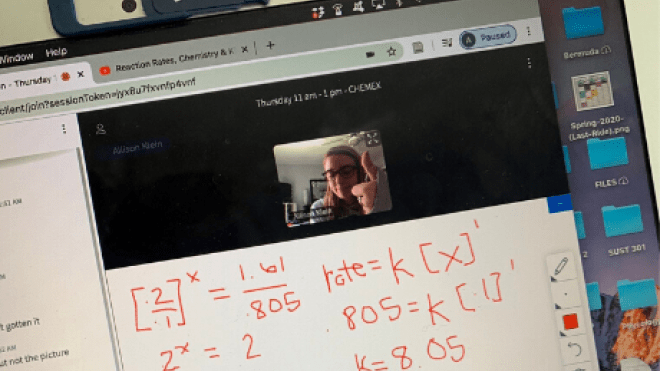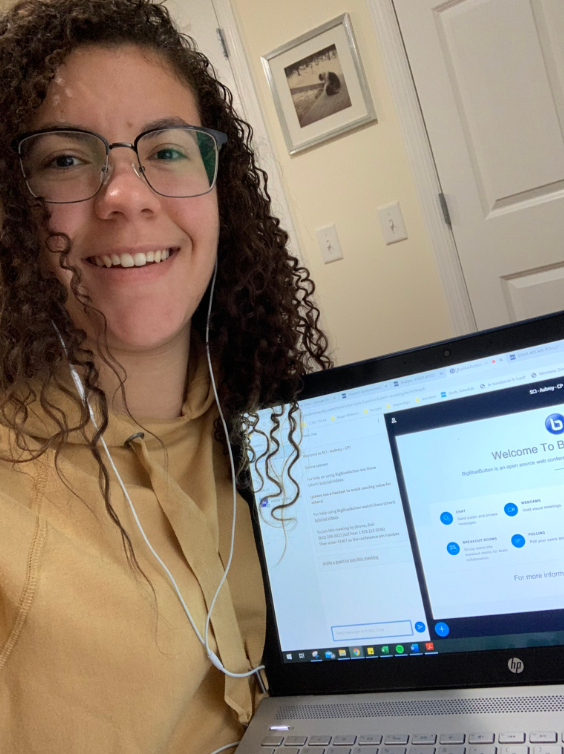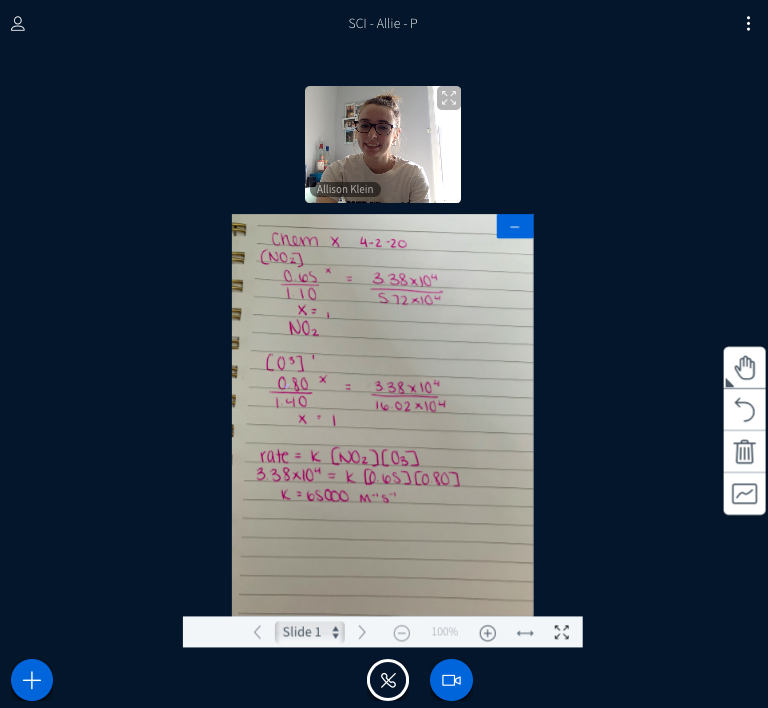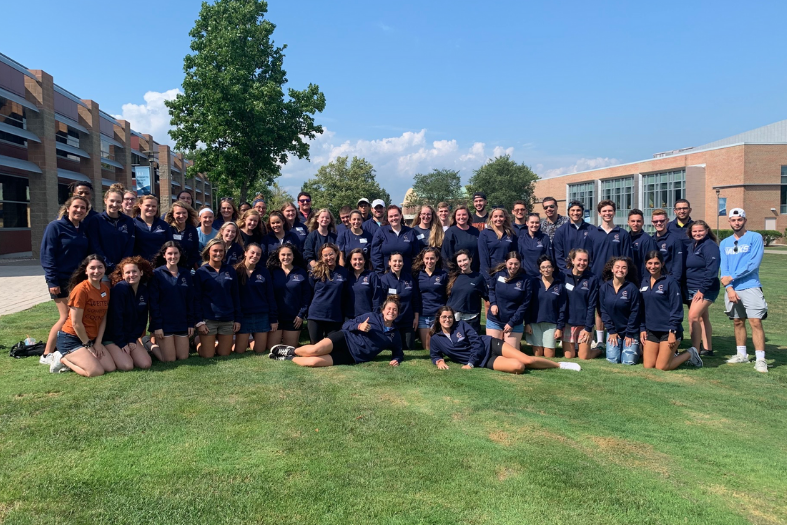Mentors and Tutors Provide Support Virtually in a Time of Transition
With the transition to remote learning, the Center for Student for Student Academic Success (CSAS) has created new ways to support students. This story is part of a series highlighting how RWU is offering innovative, student-centered approaches to education as classes pivot to online formats for the remainder of the Spring 2020 semester.

“I will continue to assure my mentees that they have people who support them even in times of uncertainty. Thankfully, a peer mentor’s bond with a student can grow stronger because of the technology we have ..."
- RWU Senior Maggie Myers
BRISTOL, R.I. – In just a few weeks, 60 peer mentors, 50 writing tutors, 45 math tutors, 44 science tutors, and one computer information systems (CIS) tutor, opened up their virtual offices to help students navigate the new world of online learning.
The Center for Student Academic Success (CSAS) reminds students they are not alone, as they log into remote classrooms and complete assignments from their homes.
“I have been impressed with how the CSAS team and our student leaders have stepped up and couldn’t be prouder of our entire team," said Associate Dean of Student Success Allison Chase Padula. "The RWU community is truly a family and it is in times like these that the care and support of our students has never been more apparent.”

For specific academic support, students can turn to tutors for support in various subject areas.
“This is a mainly a peer tutoring platform, which means we have taken the class beforehand and have done well in it,” said senior Marine Biology major Allie Klein. “Aside from tutoring, I also frequent the center to receive tutoring in my own classes so I know the important impact tutors can have on coursework especially in the STEM field.”
Now, students access tutors for math, science, and CIS through the Bridges platform and get help with their writing by sending an email to writinghelp@rwu.edu.
Director of the Tutoring Center Karen Billoti coordinated trainings for students so they are equipped not only for the technical aspects of online tutoring, but also to provide encouragement in a virtual platform.
And RWU tutors across subject matters have found innovative solutions to challenges that come with working remotely.
Take Klein, who tutors Chemistry and Physics.
“I have found that writing long chemical equations can be difficult using the online white board, so another technique I developed was to write the equation on a notebook, upload a picture of the notebook to my computer, and then share my screen and talk through the problem,” Klein said.

Writing tutors make a point to provide comments in a conversational, supportive way, even when they cannot meet in person.
“We don’t make direct revisions to the paper, and instead leave comments explaining our suggestions, because we want to keep the concept of having a conversation around writing as authentic as possible given the circumstances, and not just give answers without ensuring the student leaves a more confident writer,” sophomore American Studies major Noelle Craveiro said. “I have tried to write as supportively and humanly as I can. I understand that everyone is in an unfamiliar spot that can cause a lot of stress, so I try my best not to sound like a computer in hopes that the student knows that they’re not alone and that help is out there.”
Meeting with a tutor, especially during this difficult time, has outcomes that extend beyond academic success.
“The online tutoring platforms are giving our RWU students another place to see each other, to work together, and be in community together as we deal with this unprecedented global crisis,” said Science Center Coordinator Tracey McDonnel Wysor.
Peer mentoring, which pairs upperclassmen with new students to help them navigate university life, is also a crucial resource during this adjustment period.
"I have been reaching out to my mentees a lot during this time,” said senior History and Secondary Education major Kristen Puk. “The important part to remember about our program is that we are a support system for students. They can come to us with any problem or concern and we'll try to help in any way that we can.”
Upon learning that students would not be returning to campus, Elizabeth Niemeyer, director of Advising and Peer Mentorship, consulted with the instructional design team, to set up virtual office hours for professional and student staff.
“We've had to be nimble to update our processes and most of all, stay positive as we are working through the kinks,” said Niemeyer.
Students are provided with time frames and a meeting ID so that they can join a Zoom chatroom whenever they need assistance. Though the mentors were accustomed to using technology to supplement their interactions with students before, the lack of in-person meetings means they must work even harder to reach out to their mentees.
“I am thankful for all of the training that I have received so I am now prepared to best support the students and answer the questions they may have,” senior Business Management major Maggie Myers said.

Myers was inspired to become a peer mentor because as an underclassman, she found having one invaluable.
“It’s important that this program continues because we have so much knowledge that we’ve acquired during our time here and it gives us a chance to help others,” she said. “I will continue to assure my mentees that they have people who support them, even in times of uncertainty. Thankfully, a peer mentor’s bond with a student can grow stronger because of the technology we have, and that’s something that won’t go away despite any unforeseen circumstance.”
Niemeyer believes her team’s response to the changes demonstrates the resiliency of our campus community. She has faith that we will continue to support each other, even when we cannot be physically together on campus.
“As a community, we have really come together in ways I didn't previously see possible,” she said. “I am sure we will encounter many more challenges, but am confident we will work though them.”
Along with the Tutoring Center and Advising & Peer Mentorship Office, Student Accessibility Services is supporting students with disabilities remotely, providing academic accommodations and recommending strategies for adjusting to online learning.
“When confronted with monumental challenges, people rise to the occasion: Students, staff and faculty,” Chase Padula said. “It is my hope that at the end of this, we will look back and have been able to identify areas that will help us as an institution better serve our students, create new opportunities for learning and growth, and reflect on how this experience has changed us all. I’m sure none of us will ever forget the spring 2020 semester!”
Students, Faculty, Staff: Do you have a story of innovative distance learning at RWU? Email us at stories@rwu.edu